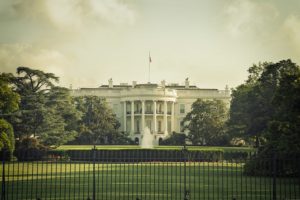
FDA commits to reviewing mifepristone regulations, President Trump doubles tariffs on steel and aluminum, and more…
IN THE NEWS
- Food and Drug Administration (FDA) Commissioner Martin A. Makary committed to conducting a review of mifepristone, a medication used to end intrauterine pregnancies through ten weeks gestation, in a letter to U.S. Senator Josh Hawley (R-Mo.). Makary said that, “as with all drugs, FDA continues to closely monitor the postmarketing safety data on mifepristone for the medical termination of early pregnancy.” Makary’s commitment comes alongside a pending lawsuit filed by Idaho, Kansas, and Missouri, which argue that FDA should roll back access to mifepristone, despite pushback from the Trump Administration, which argues that the states do not have standing to sue.
- Attorneys general from California, Massachusetts, New Jersey, and New York petitioned FDA to lift stringent restrictions on mifepristone. The petition argues that current rules hinder primary care prescribing despite evidence of the drug’s safety, aiming to counter anti-abortion efforts to limit access. Supporters, including New York Attorney General Letitia James and advocates for reproductive rights, praised the move as expanding health care access, but critics, including anti-abortion groups, contended that it could undermine safety protocols and state-level abortion laws.
- President Donald J. Trump announced that tariffs on steel and aluminum imports will double from 25 to 50 percent at midnight on Wednesday, June 4. Notably, the tariff increase includes an exemption for the United Kingdom under the recently signed U.S.-UK Economic Prosperity Deal. President Trump stated that the tariff increase would “secure the steel industry” in the United States and “more effectively counter foreign countries.” Some organizations representing metal workers, however, emphasized the need to pursue alternative avenues beyond tariffs to strengthen U.S. manufacturing.
- Citigroup reversed its firearms policy, ending restrictions on banking services for gun manufacturers and sellers implemented after the 2018 school shooting in Parkland, Florida. The bank updated its policies to prohibit discrimination based on political affiliation, responding to President Trump’s accusations of bias against conservatives. Supporters, including the White House, praised the move as promoting fair access, but critics, including advocates for gun control, contended that it would weaken efforts to curb gun violence by easing financial oversight of firearms businesses.
- The One, Big, Beautiful Bill Act, which addresses tax-advantaged savings options, passed the U.S. House of Representatives and now moves to the U.S. Senate for consideration. Key provisions of the bill target enhancements to 529 plans and “Achieving Better Life Experience” (ABLE) accounts while introducing additional savings provisions. The bill would expand the definition of qualified higher education expenses for 529 plans, allowing families to use their savings for a broad range of educational needs, including books, online education resources, tutoring services, and standardized test fees. The bill would also establish an ABLE-to-Work provision as a permanent feature, enabling eligible working ABLE account owners to contribute beyond the standard annual limit. If enacted in its present form, this legislation could impact how families save for education and disability-related expenses, although it may face amendments as it progresses through the Senate.
- The U.S. Securities and Exchange Commission (SEC) asked a federal judge to dismiss its lawsuit against Binance, a cryptocurrency exchange, and its founder, Changpeng Zhao. The SEC had accused Binance of inflating trading volumes, commingling customer funds, and unlawfully allowing for the trading of cryptocurrency assets that the SEC viewed as unregistered securities. This dismissal is a further step toward less cryptocurrency oversight under the second Trump Administration, after the SEC dismissed a lawsuit against Coinbase in February and the U.S. Department of Justice disbanded its cryptocurrency enforcement unit in April.
- The U.S. Department of the Interior proposed rescinding a 2024 Bureau of Land Management rule that imposes limits on oil and gas exploration and development in Alaska’s National Petroleum Reserve. Secretary of the Interior Doug Burgum explained that this proposed rescission aligns the Bureau’s regulations with the Naval Petroleum Reserves Production Act of 1976, which created the National Petroleum Reserve. The Interior Department also noted that rescinding the rule would support energy independence, a goal reflected in several of President Trump’s executive orders. The rescission would revert to earlier regulations that aim to balance resource development with protections for wildlife, subsistence uses, and surface values.
- The U.S. Court of Appeals for the Federal Circuit granted the Trump Administration’s request to pause temporarily a ruling by the U.S. Court of International Trade that struck down President Trump’s “Liberation Day” tariffs. This temporary stay, described as a “procedural step” by the nonprofit group who sued over the tariffs, allows the Federal Circuit time to consider whether to grant a longer stay while the Administration pursues its appeal. The Federal Circuit’s order directed the plaintiffs to respond by June 5, with the Administration permitted to issue a reply by June 9.
WHAT WE’RE READING THIS WEEK
- In a working paper for the George Washington University Regulatory Studies Center, Roger Nober, director of the Center and a professor of practice at the University’s Trachtenberg School of Public Policy and Public Administration, reviewed the formal and informal ways in which agencies make policy through precedential adjudications. Nober argued that there are significant process and fairness considerations at stake, even for stakeholders with deep understandings of adjudication issues. Nober broadly suggested that improving stakeholder access to appeals before a final agency action and increasing agency transparency to outside stakeholders during the adjudication process are modest solutions to the problems precedential adjudications create.
- In a recent article published in the N.Y.U. Journal of Legislation and Public Policy, Susan E. Dudley, then-director of the George Washington University Regulatory Studies Center, argued that fiscal budgeting concepts could enhance regulatory efficiency. Dudley proposed that applying budgetary principles, such as cost-benefit analysis and periodic review, could improve decision-making by prioritizing resource allocation and reducing inefficiencies. Her framework emphasized retrospective review to ensure regulations achieve intended outcomes without unnecessary costs. Dudley likened regulatory choices to budget trade-offs, aiming to maximize public benefits.
- In a recent Brookings Institution article, Tonantzin Carmona, a fellow at Brookings Metro, argued that policymakers should focus future cryptocurrency regulation around three principles: protecting financial stability; preventing market manipulation; and protecting communities, infrastructure, and national security from cryptocurrency-related harms. Carmona contended that, without safeguards, volatility in the cryptocurrency market could expose banks, retirement systems, and retail investors to serious risk. Carmona also highlighted that Bitcoin mining has placed outsized burdens on rural and industrial communities across the United States, contributing to negative environmental, public health, and cybersecurity consequences. To combat this problem, state and federal lawmakers should take coordinated, urgent action to regulate cryptocurrency, Carmona argued.
EDITOR’S CHOICE
- In an essay in The Regulatory Review, Sijeong Lim, an associate professor of international studies at Korea University, and Aseem Prakash, the Walker Family Professor for the Arts and Sciences and a professor of political science at the University of Washington, Seattle, found that that carbon pricing policies adopted around the world are positively associated with increased innovation in climate-friendly technologies. Barriers for implementing these policies exist, however, due to the unpopularity of programs such as carbon taxes, as well as political turmoil, which spikes energy prices and forces the suspension of some policies and the utilization of strategic oil reserves. Lim and Prakash suggested that flexible regulations could promote innovation, challenging the conventional wisdom that regulations depress innovation and noting that carbon pricing could be considered one such innovative regulation.



